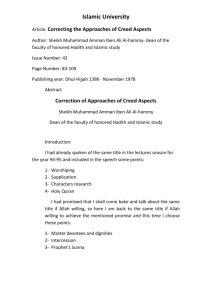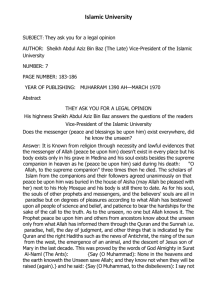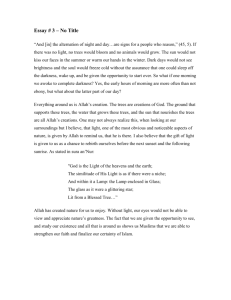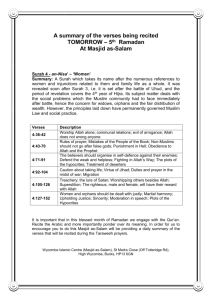deatH, be not proud: a critical study
advertisement
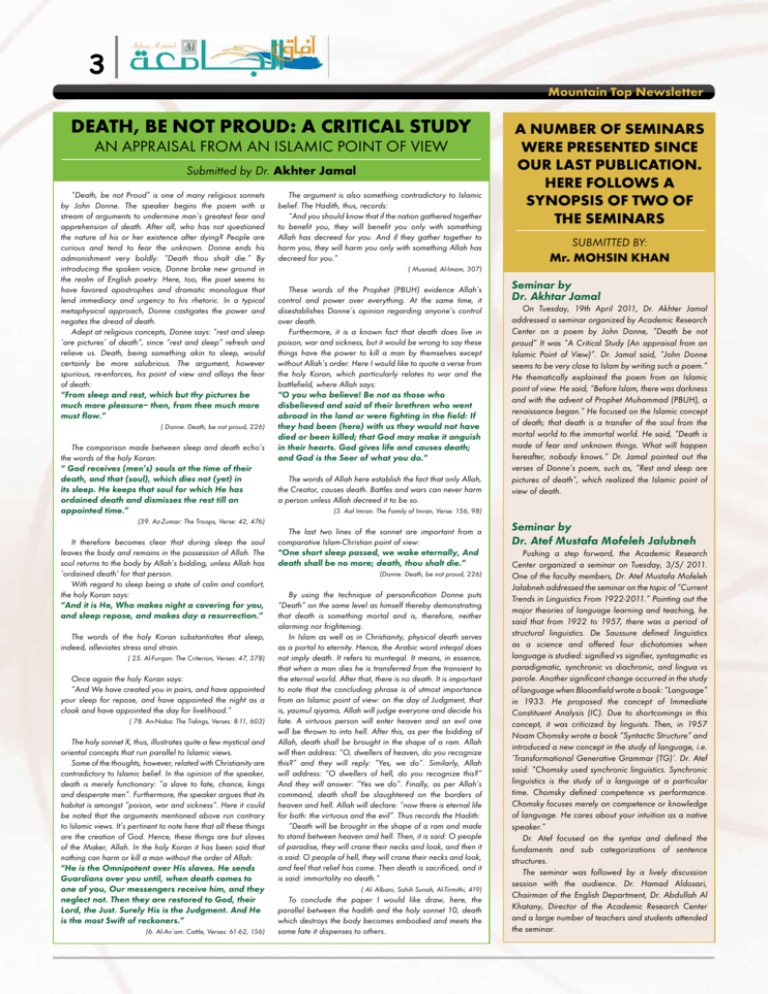
3 Aafaaq Al-jaam'h Mountain Top Newsletter Death, be not proud: A Critical Study An appraisal from an Islamic point of view Submitted by Dr. Akhter Jamal “Death, be not Proud” is one of many religious sonnets by John Donne. The speaker begins the poem with a stream of arguments to undermine man’s greatest fear and apprehension of death. After all, who has not questioned the nature of his or her existence after dying? People are curious and tend to fear the unknown. Donne ends his admonishment very boldly: “Death thou shalt die.” By introducing the spoken voice, Donne broke new ground in the realm of English poetry. Here, too, the poet seems to have favored apostrophes and dramatic monologue that lend immediacy and urgency to his rhetoric. In a typical metaphysical approach, Donne castigates the power and negates the dread of death. Adept at religious concepts, Donne says: “rest and sleep ‘are pictures’ of death”, since “rest and sleep” refresh and relieve us. Death, being something akin to sleep, would certainly be more salubrious. The argument, however spurious, re-enforces, his point of view and allays the fear of death: The argument is also something contradictory to Islamic belief. The Hadith, thus, records: “And you should know that if the nation gathered together to benefit you, they will benefit you only with something Allah has decreed for you. And if they gather together to harm you, they will harm you only with something Allah has decreed for you.” “From sleep and rest, which but thy pictures be much more pleasure– then, from thee much more must flow.” “O you who believe! Be not as those who disbelieved and said of their brethren who went abroad in the land or were fighting in the field: If they had been (here) with us they would not have died or been killed; that God may make it anguish in their hearts. God gives life and causes death; and God is the Seer of what you do.” ( Donne. Death, be not proud, 226) The comparison made between sleep and death echo’s the words of the holy Koran: “ God receives (men’s) souls at the time of their death, and that (soul), which dies not (yet) in its sleep. He keeps that soul for which He has ordained death and dismisses the rest till an appointed time.” ( Musnad, Al-Imam, 307) These words of the Prophet (PBUH) evidence Allah’s control and power over everything. At the same time, it disestablishes Donne’s opinion regarding anyone’s control over death. Furthermore, it is a known fact that death does live in poison, war and sickness, but it would be wrong to say these things have the power to kill a man by themselves except without Allah’s order. Here I would like to quote a verse from the holy Koran, which particularly relates to war and the battlefield, where Allah says: The words of Allah here establish the fact that only Allah, the Creator, causes death. Battles and wars can never harm a person unless Allah decreed it to be so. “And it is He, Who makes night a covering for you, and sleep repose, and makes day a resurrection.” The words of the holy Koran substantiates that sleep, indeed, alleviates stress and strain. ( 25. Al-Furqan: The Criterion, Verses: 47, 378) Once again the holy Koran says: “And We have created you in pairs, and have appointed your sleep for repose, and have appointed the night as a cloak and have appointed the day for livelihood.” ( 78. An-Naba: The Tidings, Verses: 8-11, 603) The holy sonnet X, thus, illustrates quite a few mystical and oriental concepts that run parallel to Islamic views. Some of the thoughts, however, related with Christianity are contradictory to Islamic belief. In the opinion of the speaker, death is merely functionary: “a slave to fate, chance, kings and desperate men”. Furthermore, the speaker argues that its habitat is amongst “poison, war and sickness”. Here it could be noted that the arguments mentioned above run contrary to Islamic views. It’s pertinent to note here that all these things are the creation of God. Hence, these things are but slaves of the Maker, Allah. In the holy Koran it has been said that nothing can harm or kill a man without the order of Allah: “He is the Omnipotent over His slaves. He sends Guardians over you until, when death comes to one of you, Our messengers receive him, and they neglect not. Then they are restored to God, their Lord, the Just. Surely His is the Judgment. And He is the most Swift of reckoners.” (6. Al-An’am: Cattle, Verses: 61-62, 156) SUBMITTED BY: Mr. MOHSIN KHAN Seminar by Dr. Akhtar Jamal On Tuesday, 19th April 2011, Dr. Akhter Jamal addressed a seminar organized by Academic Research Center on a poem by John Donne, “Death be not proud” It was “A Critical Study (An appraisal from an Islamic Point of View)”. Dr. Jamal said, “John Donne seems to be very close to Islam by writing such a poem.” He thematically explained the poem from an Islamic point of view. He said, “Before Islam, there was darkness and with the advent of Prophet Muhammad (PBUH), a renaissance began.” He focused on the Islamic concept of death; that death is a transfer of the soul from the mortal world to the immortal world. He said, “Death is made of fear and unknown things. What will happen hereafter, nobody knows.” Dr. Jamal pointed out the verses of Donne’s poem, such as, “Rest and sleep are pictures of death”, which realized the Islamic point of view of death. (3. Aal Imran: The Family of Imran, Verse: 156, 98) (39. Az-Zumar: The Troops, Verse: 42, 476) It therefore becomes clear that during sleep the soul leaves the body and remains in the possession of Allah. The soul returns to the body by Allah’s bidding, unless Allah has ‘ordained death’ for that person. With regard to sleep being a state of calm and comfort, the holy Koran says: A number of seminars were presented since our last publication. Here follows a synopsis of two of the seminars The last two lines of the sonnet are important from a comparative Islam-Christian point of view: “One short sleep passed, we wake eternally, And death shall be no more; death, thou shalt die.” (Donne. Death, be not proud, 226) By using the technique of personification Donne puts “Death” on the same level as himself thereby demonstrating that death is something mortal and is, therefore, neither alarming nor frightening. In Islam as well as in Christianity, physical death serves as a portal to eternity. Hence, the Arabic word inteqal does not imply death. It refers to munteqal. It means, in essence, that when a man dies he is transferred from the transient to the eternal world. After that, there is no death. It is important to note that the concluding phrase is of utmost importance from an Islamic point of view: on the day of Judgment, that is, yaumul qiyama, Allah will judge everyone and decide his fate. A virtuous person will enter heaven and an evil one will be thrown to into hell. After this, as per the bidding of Allah, death shall be brought in the shape of a ram. Allah will then address: “O, dwellers of heaven, do you recognize this?” and they will reply: “Yes, we do”. Similarly, Allah will address: “O dwellers of hell, do you recognize this?” And they will answer: “Yes we do”. Finally, as per Allah’s command, death shall be slaughtered on the borders of heaven and hell. Allah will declare: “now there is eternal life for both: the virtuous and the evil”. Thus records the Hadith: “Death will be brought in the shape of a ram and made to stand between heaven and hell. Then, it is said: O people of paradise, they will crane their necks and look, and then it is said: O people of hell, they will crane their necks and look, and feel that relief has come. Then death is sacrificed, and it is said: immortality no death.” ( Al- Albani, Sahih Sunah, Al-Tirmithi, 419) To conclude the paper I would like draw, here, the parallel between the hadith and the holy sonnet 10, death which destroys the body becomes embodied and meets the same fate it dispenses to others. Seminar by Dr. Atef Mustafa Mofeleh Jalubneh Pushing a step forward, the Academic Research Center organized a seminar on Tuesday, 3/5/ 2011. One of the faculty members, Dr. Atef Mustafa Mofeleh Jalabneh addressed the seminar on the topic of “Current Trends in Linguistics From 1922-2011.” Pointing out the major theories of language learning and teaching, he said that from 1922 to 1957, there was a period of structural linguistics. De Saussure defined linguistics as a science and offered four dichotomies when language is studied: signified vs signifier, syntagmatic vs paradigmatic, synchronic vs diachronic, and lingua vs parole. Another significant change occurred in the study of language when Bloomfield wrote a book: “Language” in 1933. He proposed the concept of Immediate Constituent Analysis (IC). Due to shortcomings in this concept, it was criticized by linguists. Then, in 1957 Noam Chomsky wrote a book “Syntactic Structure” and introduced a new concept in the study of language, i.e. ‘Transformational Generative Grammar (TG)’. Dr. Atef said: “Chomsky used synchronic linguistics. Synchronic linguistics is the study of a language at a particular time. Chomsky defined competence vs performance. Chomsky focuses merely on competence or knowledge of language. He cares about your intuition as a native speaker.” Dr. Atef focused on the syntax and defined the fundaments and sub categorizations of sentence structures. The seminar was followed by a lively discussion session with the audience. Dr. Hamad Aldosari, Chairman of the English Department, Dr. Abdullah Al Khatany, Director of the Academic Research Center and a large number of teachers and students attended the seminar.


